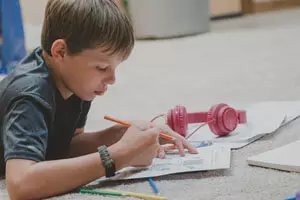MONTESSORI THERAPY PRESCHOOL BURLESON, TX
Rooted Life Montessori is a Montessori preschool and Elementary located in Burleson, TX. We specialize in utilizing the Montessori therapy method to help students reach and surpass academic goals from an early age. Rooted Life Montessori is dedicated to the education of the whole child. Our Montessori classroom strives to meet each individual child’s intellectual, physical, social, and emotional needs.
Montessori Therapy is rooted in 5 core components:
- Trained Teachers
- The multi-age classroom
- Use of authentic Montessori didactic materials
- Child-directed work
- Uninterrupted work periods
Rooted Life Montessori Academic Therapy center is recognized by the American Montessori Society (AMS) as a school on the Pathway to Excellence, adhering to these 5 tenets.
Dr. Maria Montessori created a method, a set of materials, and a philosophy of how a child learns best through the scientific process of observing and studying the child. She was a scientist and a Doctor who specialized in pediatrics and psychology. Her understanding of early childhood development, both physically and psychologically, is the reason for the brilliance and science behind the method. This method and the corresponding didactic materials were originally created for her work and studies of the exceptional child (and then later applied successfully to all children). The Montessori curriculum is over 150 years old and has passed the test of time.
A neurotypical child stepping into a Montessori therapy classroom has the executive functioning skills to create order, concentration, coordination, and independence in the 5 areas of self-directed learning listed above. However, a child who has atypical development in the areas of CLAP (coordination, language, attention, and perception) will struggle with this natural acquisition of order and self-directed learning. This is the heart of where our trained Montessori therapists step in.
Our Montessori morning is structured to aid a child to transition from external reinforcements and guidance toward order, gradually toward internal and self-directed guidance toward order. The duration, frequency, and rate of prompt-fade will be different for each child, as we are passionate about creating an individualized match and expanse of each child’s current skill-set (academic, social, and emotional).
8-9:15am: Motor Lab: Children will cycle through stations of gross and fine motor work including: I.M., balance board, bear crawls, crab walks, rebounding, obstacle course, rhythmic writing, SEE handwriting, Montessori Practical Life, etc. We refer to the Perceptual Skills Training Manual for each age to target gross and fine motor development and remediation.
9:30-12:30 Montessori classroom: including math, sensorial, language, and cultural didactic materials taught with the addition of MACAR (Montessori Applied to Children at Risk) theory.
1 Hour Pull-out: During the morning work cycle, each child will be pulled out for language therapy (TEACH or SEE program) and cognitive therapy (I.M. or N.F.B.) Parents may choose all 3: Language therapy, I.M. and N.F.B. if they desire.
(Based on recommendations from Debbie Hume during intake)
Most incoming students start with the TEACH + I.M. therapy and will progress in 6-12 months, depending on the severity of CLAP deficits.
DEVELOPING THE FOUR CORE SKILLS

- Order(O): Order is created both externally, through a well-organized environment, and internally, in the way the child operates within the classroom. Thus, a routine is very important as well; with a place for every thing and every thing in its place.
- Concentration (C): Concentration is necessary behavior before any learning takes place, and our classroom procedures and materials encourage it. The child who laboriously scrubs a table and attends to the details of their work is laying the foundation for calm effortless concentration in future academic pursuits.
- Coordination( C): Physical coordination is necessary behavior for children because they learn through the body and senses. Skills such as balance, hand-eye coordination, rhythm, fine-motor control, and body control are all cultivated through opportunities provided by the materials. Attention to movement is not instinctive, but is rather a planned, voluntary action.
- Independence (I): Independence is a goal of learning and comes from a child’s innate desire to understand and affect his or her environment. It is only through self-motivated accomplishments that we experience the joy of learning.
Without OCCI, no academic curriculum has the opportunity to flourish. So, too, our primary classroom therapy room has its root encapsulated in a soil of OCCI to allow your child’s full potential to bloom.

